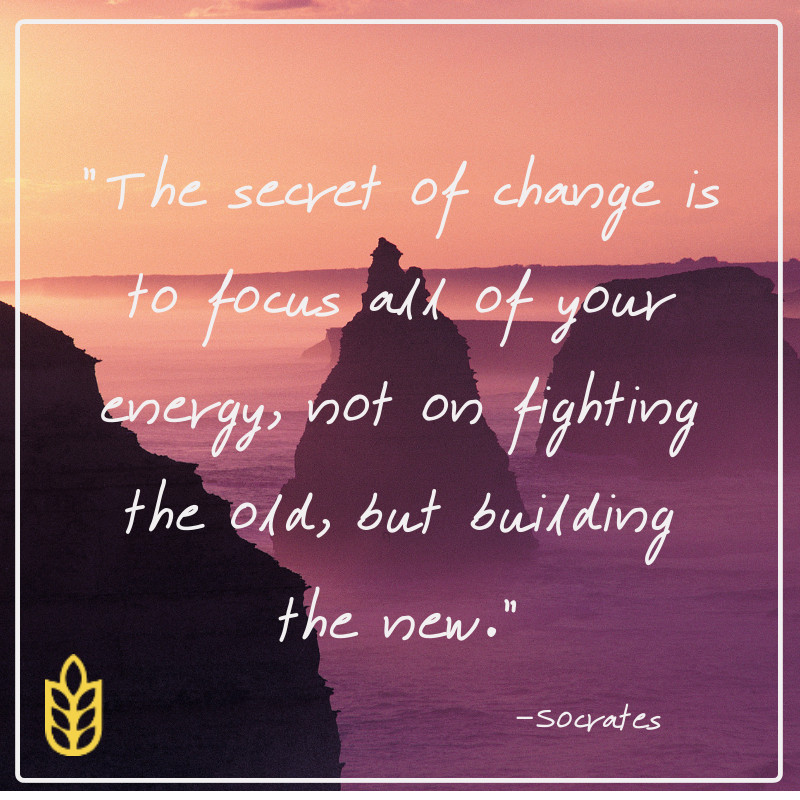Making Changes That Last: Changing the Way We Approach Change

Spring is in the air, and so is change! New weather, Spring cleaning, and more - all of these things are catalysts for change. Change can be for the better or for the worse, but all changes bring about a certain level of stress with them. Because change isn’t easy. Whether it’s changes to your eating habits, social habits, or lifestyle - these changes can be stressful, time-consuming, and energy-consuming; and making changes “stick” in the long run is downright difficult sometimes! True, lasting change is gradual. So, in the same way that one develops unhealthy habits over time, those habits must be replaced over a similar timeline with consistent, better ones. And It’s important to find a balance between being excited about the short-term changes and what they’ve brought and balance that with still staying motivated and on track to maintain these changes and new habits...and they must be consistently maintained until they truly become your permanent “new normal”.
So, let’s discuss the process of change; particularly what occurs in the mind. During the initial phase of change, you may be preoccupied with it - constantly thinking about it or even talking about it with your spouse, friends, or family. You might even be filled with anxious anticipation. Next, you may feel awkward and even somewhat panic-stricken. We’re here to tell you, this reaction is completely normal (and primal); so, just breathe! Momentary feelings of chaos are completely normal as you enter into the process of letting go of old "anchors" or ways of doing things before executing new behaviors and habits. This is a process that occurs as much internally (thoughts, feelings, and more) as it does externally (outward behaviors and actions). Change is a process that requires your full attention, planning, and practice! There will be times when you feel unable to embrace the change - it’s too stressful, it’s too hard, it’s inconvenient...these thoughts are going to happen from time to time. So, don’t worry; you’re not alone. They happen to all of us. So, for many of us, the first step for developing permanent habits is going to be changing the way we approach change.
The good news is we’ve got plenty of strategies and tips for tackling resistance to change head-on! But, before we talk about those, it’s important to first understand the ways that we are prone to resist change. The mind is powerful, and we need to become aware of ways that we talk ourselves out of change. Read through the following Resistance Strategies, and pick out the ones that resonate with resistance behaviors you’ve exhibited:
- DELAY: We procrastinate doing the things we really need or should do so that we can instead continue doing the things we want to do.
Example: You really need and want to start an exercise regimen, but you sleep in simply because you want the extra zzz’s. - DENIAL: We refuse to acknowledge actual events or personal experiences that are apparent to others.
Example: “I don't eat a lot of desserts” (you say as you finish a pint of ice cream). - RATIONALIZING: We conceal our thoughts, feelings, and actions by creating a set of reassuring and self-serving - but incorrect - explanations.
Example: “I can't change the way I eat because I have to cook for my whole family!” - AVOIDANCE: We behave in ways that prevent us from being in situations or around people we perceive as threatening to our normal habits.
Example: “I’m running too far behind to get to that spin class early enough to get the seat I want. I’ll go next week.” - CHOOSING NOT TO COUNTER NEGATIVE THOUGHTS: Sometimes, people hang onto negative, pessimistic or anxious thoughts about the changes they are about to undertake. In doing so, we’ve made up our minds before we’ve even started that we will not be successful.
Example: “This will be another failed attempt to manage my weight. Just like the past 10 times I’ve tried, this time isn’t going to work and stick either.” - LACKING NECESSARY SKILLS: Deep down, we might believe we don't have the needed skills or knowledge to change; so, instead of pursuing that knowledge or developing those skills, we choose not to.
Example: “I don't know how to do yoga. I can’t go to a class and make a fool of myself. Plus, I’ll probably hurt myself anyway.” - PAYOFFS FOR UNHEALTHY BEHAVIOR: Sometimes, we maintain unhealthy behaviors because there are powerful rewards for doing so; such as getting attention from others, getting immediate gratification, or avoiding work, stress, and relational problems, etc.
Example: Eating large amounts of chocolate, chips or other unhealthy snacks because they provide us with an immediate feeling of calmness and relief...even though we know that 30 minutes letter, these decisions bring regret...thus, the cycle repeats.
Which of those Resistance Strategies resonated with you most? It could be just one or it could be all of them. But being able to identify them is the first step to putting a stop to these thoughts and behaviors that prevent permanent change. So, now that we understand the ways in which we resist change in our lives, let’s discuss strategies that will help us overcome them, and instead become agents of change!
- Talking about your fears and concerns to others you trust to be honest with you can help reduce the intensity of your feelings. It will also help you to foster a more realistic perspective about the change process. Remember, there’s comfort in a multitude of counsel. Gaining a perspective other than our own is invaluable!
- Get social support and the aid you may need from others. These can be support groups that align with your struggles or people you may know less personally but to whom you relate well. They, too, can be your most powerful allies for overcoming negative, pessimistic and anxious thoughts.
- Journaling is a way to identify your thoughts and behaviors. It’s an objective (rather than subjective) historical record of your actions. We, as humans, have a tendency to recall thoughts in the light that is most serving to ourselves at the time (and may not be the most accurate telling of events). Journaling is much more concrete.
- Seeking out needed information and acquiring necessary skills can give you the confidence you need to square off with any change challenge. We’ve all heard the phrase, “No question is a stupid question”. You can’t know what you don’t know; so, ask away! Asking questions allows you to gain clarity and perspective, and it empowers you to more confidently approach change.
- Take an honest inventory of the things you believe you gain from your unhealthy behaviors or current habits. Honestly inventorying the things you believe you gain from your unhealthy behavior will not only help you identify the “real need”, but will help you create healthier ways to meet those needs.
- Nix any self condemnation or illegitimate guilt. After all, we’re all only human! Instead, create and foster a positive head and heartspace by complimenting yourself on a job well done - even for the small things. All victories count! It’s okay to acknowledge the things that haven’t gone so well, but don’t dwell on them. Learn from them and move on.
 When we can change the way we approach change, there’s no limit to the amount of long-lasting impact you can make in your own life. Remember, positive thoughts encourage while negative ones discourage. It’s natural to find yourself in an off-mood from time to time. This can hinder the change process and make our mindspace more convoluted. To help clear your headspace and get back to that better place that facilitates change, remind yourself yourself of all the good that can also come of a challenge. Think about the opportunities, direction, personal power, moving beyond self-imposed limitations, tapping in to new resources, new creativity, knowledge, and the wisdom that comes from an honest self-inventory. A borrowed quote from Fredrick Wilcox says, “Progress always involves risk; you can’t steal second base and keep your foot on first!”
When we can change the way we approach change, there’s no limit to the amount of long-lasting impact you can make in your own life. Remember, positive thoughts encourage while negative ones discourage. It’s natural to find yourself in an off-mood from time to time. This can hinder the change process and make our mindspace more convoluted. To help clear your headspace and get back to that better place that facilitates change, remind yourself yourself of all the good that can also come of a challenge. Think about the opportunities, direction, personal power, moving beyond self-imposed limitations, tapping in to new resources, new creativity, knowledge, and the wisdom that comes from an honest self-inventory. A borrowed quote from Fredrick Wilcox says, “Progress always involves risk; you can’t steal second base and keep your foot on first!”
As you embark on your journey of change or wherever you may currently be in your journey, remember that your thoughts create feelings which directly influence your behaviors. Choosing to change the way you think by interrupting old patterns is your gateway to becoming the best and most powerful, positive version of you!
This information was adapted from Metabolic Research Center’s “Connections” curriculum class entitled “Changes”. This and a complete set of 11 other classes are available to all Metabolic Research Center clients. Interested in learning more about “Change” and other classes? Connect with a Weight Loss Specialist local to you today. These classes are complimentary to all active clients, and connect you to an environment of support and success that help facilitate positive changes in your diet and life.
By submitting this form, you agree to receive marketing text messages from us at the number provided, including messages sent by autodialer. Consent is not a condition of any purchase. Message and data rates may apply. Message frequency varies. Reply HELP for help or STOP to cancel. View our Privacy Policy and Terms of Service.

